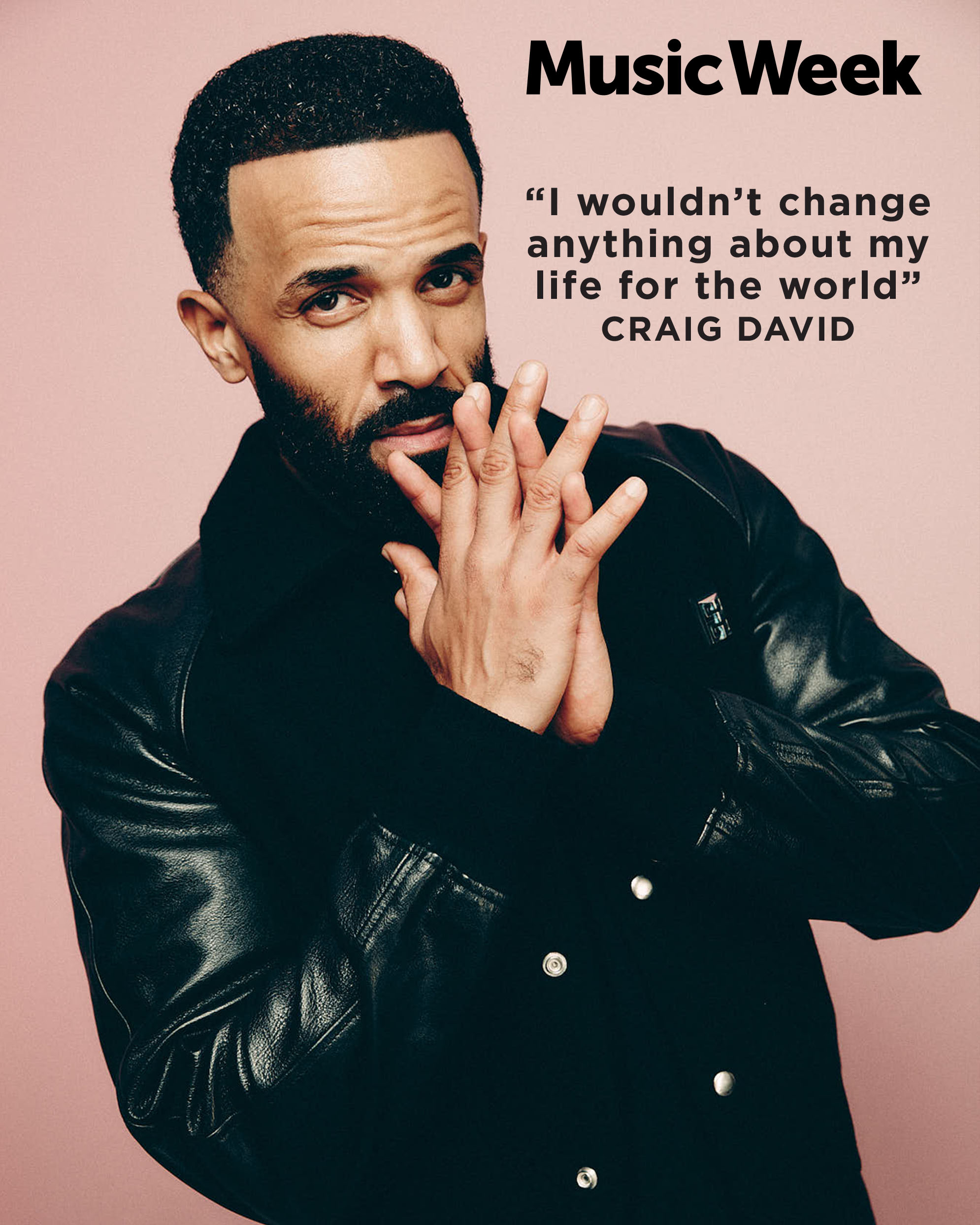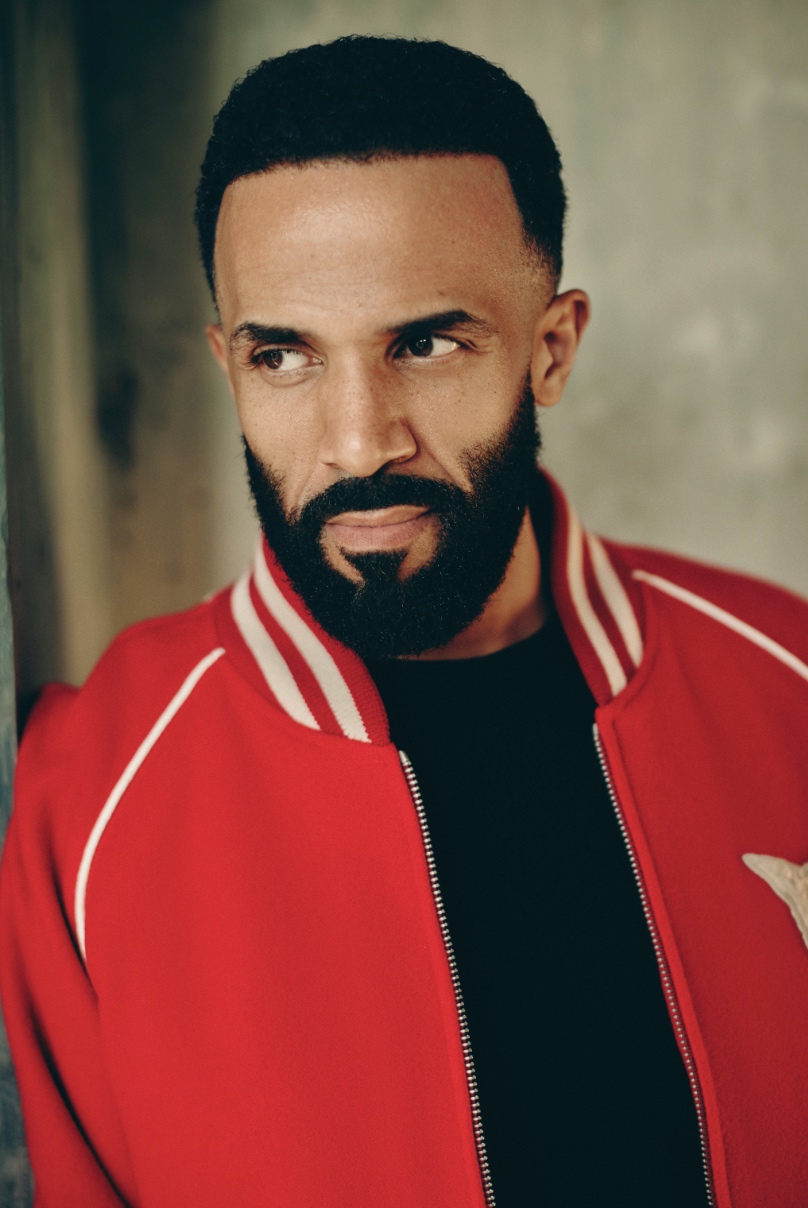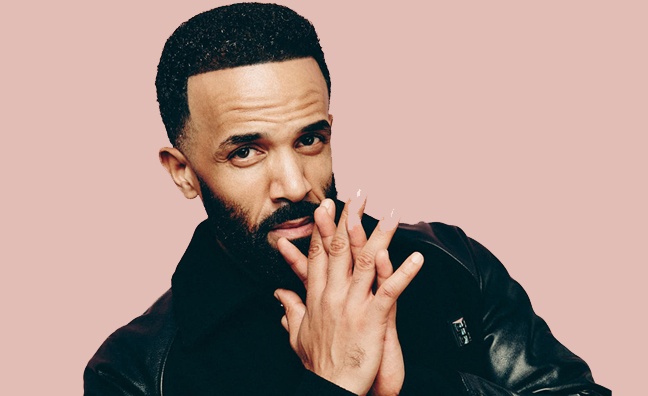Craig David's eighth album, 22, is out this week, marking the Southampton singer's 22nd year in the business. Here, in a new interview with Music Week, he reflects on his pioneering past and reveals what motivates him to keep breaking new ground...
WORDS: ANNA FIELDING
Say it’s a Wednesday and you say you’ve just interviewed Craig David. Every single response, from people of a certain age, is, “What are you doing on Thursday, Friday and Saturday? Will you chill on Sunday?”
Craig David, now 41, is in that certain age bracket. The lyrics being referred to are from his 2000 hit 7 Days (1,424,124 sales, OCC), when he was a breakout star, just about to win shelves full of awards from the MOBOs, the BRITs, the Ivor Novellos. When Craig David was “all over your… [boink]”, as his 1999 hit Re-Rewind (The Crowd Say Bo Selecta) (764,720 sales) with UK Garage act The Artful Dodger had it. When Born To Do It, the title of his multi-million selling debut album (1,975,327 sales), was apt and accurate and didn’t carry a hint of boastfulness.
Back then, he was the Y2K poster boy for UKG. But now, he’s something else. Thoughtful. Reflective. A man with different values. Many of them are reflected, lyrically, thematically, in his new album 22, out this week on BMG.
His new label home is significant, coming after a successful chart-topping comeback orchestrated in partnership with Sony imprint Insanity Records that saw 2016’s Following My Intuition (189,308 sales) reinvigorate David’s reputation, along with his hugely popular TS5 live show.
BMG’s UK director of marketing (new recordings) Lisa Wilkinson is, like many execs who cross paths with Craig David these days, thrilled to be working with an artist she grew up with.
"As an old school fan it definitely means so much more to be able to be part of his team and support him 22 years after his incredible debut,” she says. “22 really does encapsulate the journey he’s been on, moving through R&B, garage and house. It’s so exciting to see how he’s now so committed to bringing through a new generation of artists that have no doubt been hugely influenced by him. I think this will go down as his best work since Born To Do It."
His manager since the start and fellow recipient of a Queen's honour, Colin Lester is equally excited, pointing out that the fact that his client appeals to a diverse range of platforms only serves to underline his importance.
“He is as enthusiastic about music today as he was the first time I met him in his tiny bedroom stacked with vinyl at his mum’s flat on the Holyrood council estate in Southampton all those years ago,” Lester tells Music Week. “Long careers are built on blood, sweat and tears, three things that Craig David is very familiar with.”
Talking about the early days, the singer mentions driving a Peugeot 206 from his first recording sessions with Artful Dodger’s Mark Hill “listening back to that day's work on a cassette tape”. He drove back from the sessions with producer Mike Brainchild for 22 in a Mini, still listening to that day's tracks and revelling in being back in London.
“But also realising that the foxes have taken over the city,” he says. “I tell you, between three and five in the morning they run these streets.”
But, not so long ago, both his wheels and his life were radically different.
“I talk about it in the song Give It All Up on the new album,” he says, speaking to Music Week from his home studio. “It’s what I realised when I was out in Miami. The life I had, on paper, you would look at the details and say, ‘You, my friend, are living the dream.’ I was living in a beautiful apartment. I was driving a red Ferrari. But underneath the hood, pardon the pun, it was really quite empty.”
His days in Miami were lived out in the glare of the Florida sun, the nights lit up by club neons and the glimmer of celebrity friends. Then, at the end of 2019, the tabloids were full of stories about Craig David selling his ‘multi-million dollar lavish penthouse’.
“Now I’m at a point where I don’t need the ostentatious thing to give me credibility, to say who I am” he says.
He’s dressed in a plain white T-shirt and in the background his computer screen displays a standard screen saver showing tropical fish.
“When I got back to London it was about unravelling all of that,” he explains. “I’m at a point where having less of that makes me feel more like myself.”
The title of his new album was chosen partly to reference the number of years in the industry, and he isn’t afraid to look back musically, bringing in UKG basslines and a sample of Robin S’s early-90s house banger Show Me Love.
“The number resonated with me,” he says. “It’s a number to do with being of service. It’s gratifying for me to write, record and perform music. But for other people, your song can be something they form memories around. They’ll remember the good times, who they were with and who they were then.”
22 was also an album made in lockdown. Craig David, like many others who generally enjoy socialising and conversation, eventually felt the need to find some meaning. Over the course of a typically enjoyable - and typically long - conversation, we find out how he did it…

When did the new record first begin germinating in your mind?
“At the top end of lockdown, it was the same as anyone else. Making sure friends and family were okay, working out what was going on. Being creative was not at the top of my to do list. But there came a point where you just had to surrender to what was going on, find a way through it and hope for light at the end of the tunnel. I’m not unusual there. Obviously, some people were dealing with grief and caring for people who were sick. But for a lot of us, we were working with what we had. Some people got out the board games, or became amazing chefs. I decided to go upstairs, unplug all my equipment, put it back together again and find out exactly how everything worked. Learning where every cable went, stuff an engineer would always have done. Then I started listening to music, a lot of 90s, 2000s hip hop and R&B, early Destiny’s Child, Dr Dre and Notorious B.I.G. I put a little verse down, then another and then I started thinking ‘Okay, we might have an album here.’”
Didn't you record some sessions in your dressing gown?
“Yeah, proper lockdown style! But in a way it was quite similar to how I started with my first album, up in my bedroom in my shorts and T-shirt. Going out to play football with my mates and then coming back to it, flicking on the bass boost button on my headphones. Sometimes that feeling of nostalgia can be really good.”
These days, you seem to be more sure of what makes you happy and what works for you. Is that an awareness that comes with getting older?
“There’s certainly wisdom that comes with life, but I would never want to take away the excitement and the magic of doing things for the first time. We need to feel pain in order to talk about pain properly. You need to go through depression to understand depression. People who have had hard times and who have had to work through those hard times often turn out to be incredible mentors and teachers. Life is about building foundations to do the real work. Someone could say, ‘Here’s some life’ and I would say, ‘Great, go straight off the block, have the rollercoaster, go zero to 100.’ A career can ebb and flow. One minute you have a personal phone call from the president of a record company. The next you’re getting weird dial tones that tell you all the numbers have been changed. But you go through that experience and you come out the other side and know that you are enough - and that you were always enough, even back when you were the kid with the bass boost button on his headphones. I wouldn’t change anything about my life for the world, let’s put it that way.”
The vibe of 22 is about lifting people up, which could be said of a lot of your music. Why is that important to you?
“I met Vicky McClure recently and she’s been working with a choir of people with dementia. So, firstly it was amazing because I was meeting such an incredible actor. But she was also telling me about the choir and how people with dementia could remember the lyrics to certain songs verbatim, even if they might not remember your name 10 seconds after you’ve said it. That was really profound for me, more than I can sum up in words. The healing power of music. And if I have managed to create something for other people that can resonate at that level, something that connects in the head and hits the heart, well that’s important. And it doesn’t mean the music has to be meditation music from the top of the Himalayas, we’re not heading off to the rainforests or the whale song now. I can give you the ting, the riddim that will go off at the Notting Hill Carnival. But consciously, I can also try to give you something that connects. I always use Robin S, Show Me Love as the example.”
Which Beyoncé also used on her new record earlier this year. What is it about that song?
“So, let’s talk about Robin S. It’s an iconic song, with an iconic piano riff that everyone wants to use. When we were recording My Heart’s Been Waiting For You we were skirting around it and as soon as someone played the actual Robin S piano chords… That was it. Give away the publishing, let’s have the real thing and do it properly. So, the song is so euphoric. When it comes on in the club it’s hands in the air. But the verse goes, ‘heartbreaks and promises, I’ve had more than my share’ and it’s about being hurt and needing someone to show up. There’s a message that hits within the euphoria. That’s the litmus test. And, I can’t be at the age I am now and just talk about popping bottles in the club, can I?”
How are you finding working with BMG?
“Well, it’s my first time having my own label. It’s a deal done with Colin Lester who has been my manager for 22 years and has been a best friend to me and we’ve got a label called More Records, we have the TS5 label under that umbrella too. So my record goes through that and then it’s distributed by BMG and I have been really happy with them. The first label I signed to, Wildstar, that was part of Capitol Records and Telstar and Colin Lester was one of the directors there, so he’s always had that expertise of being independent-minded. I feel great that I’ve got the independent thing going creatively. But BMG really understand the assignment when it comes to distributing albums. I’m an albums artist, even though now we're moving into a different time where it's like, just keep singles running and don't worry about albums, just add that to a playlist and keep moving. I thought that BMG would understand how to land this as an album before, maybe, albums just become a thing of the past.”

You describe yourself as an albums artist, but do you still want to have that big single smash?
“What I now see as a quote-unquote ‘hit record’ is different. Before it was like, ‘Okay, how many physical sales have you got? And where are you in the charts? And are you on Top Of The Pops?’ That’s moved into a phase of streaming and YouTube and you’ve got airplay and it’s all bundled into something that gives you a chart position. Then there’s the official chart show. And still counting sales on physical. So, what does it mean? And, over my career, I’ve seen that I will sing a song like What’s Your Flava? and the crowd will know every single word. And that went in at No.8, so it doesn’t have the No.1 hit narrative. Look at Robin S again. Who knows where that charted, but it’s stood the test of time. It’s a hit. I still want songs to get airplay. That’s where it is for me. I can be on Radio 2 and 1Xtra and that means something. I want people to discover my song when they’re walking through Tesco.”
But you connect with fans on social media, too. What’s your take on the role it plays for artists these days?
“I've come from an era of not having social media, and then learned the importance of it, while also recognising that there can be smoke and mirrors. You can hype something up to the high heavens, but the things that are timeless are things that have consistency... So, I look at social media as being a way that now I can actually talk to people, respond to someone directly. I think a lot of that makes it feel so much more personal. But at the same time, I also want to talk about boundaries. It allows people to feel that they know you so well, that it can be like you're stuck. You're almost like a next door neighbour to somebody and you can have that kind of relationship. And I think I had to find a happy balance, because I'm the kind of person that would do happy birthday messages to everyone who DMs me... I have to sometimes rein myself in. But it does definitely allow me to have a different relationship with the people who are into my music.”
Alongside the record, you also have a book, What’s My Vibe, coming out. Why does the world need a book from Craig David?
“I reckon someone could do an unlicensed book about my career and get more in than I could remember. But this book is about stories. Yes, we can all tap in and have some nostalgia about The Artful Dodger and talk about my work up to now. But let’s go further back to when I was a kid in Southampton. And let's go to the present day, where I can talk about how I feel. A lot of the book is actually life lessons and talking about suffering with depression, mental health, how I felt about certain situations, impostor syndrome and lack of boundaries. But I’m speaking on it from a real authentic place of having experienced it. As opposed to that passive, ‘Well, I haven't really experienced it. But here's a few affirmations to sort you out.’ I’ve had a bit of life now, I can talk about things that aren’t related to music.”
So, finally, how would you sum up where you’re at in your career now?
“I’d say that I’m enough, and that’s okay with me.”












